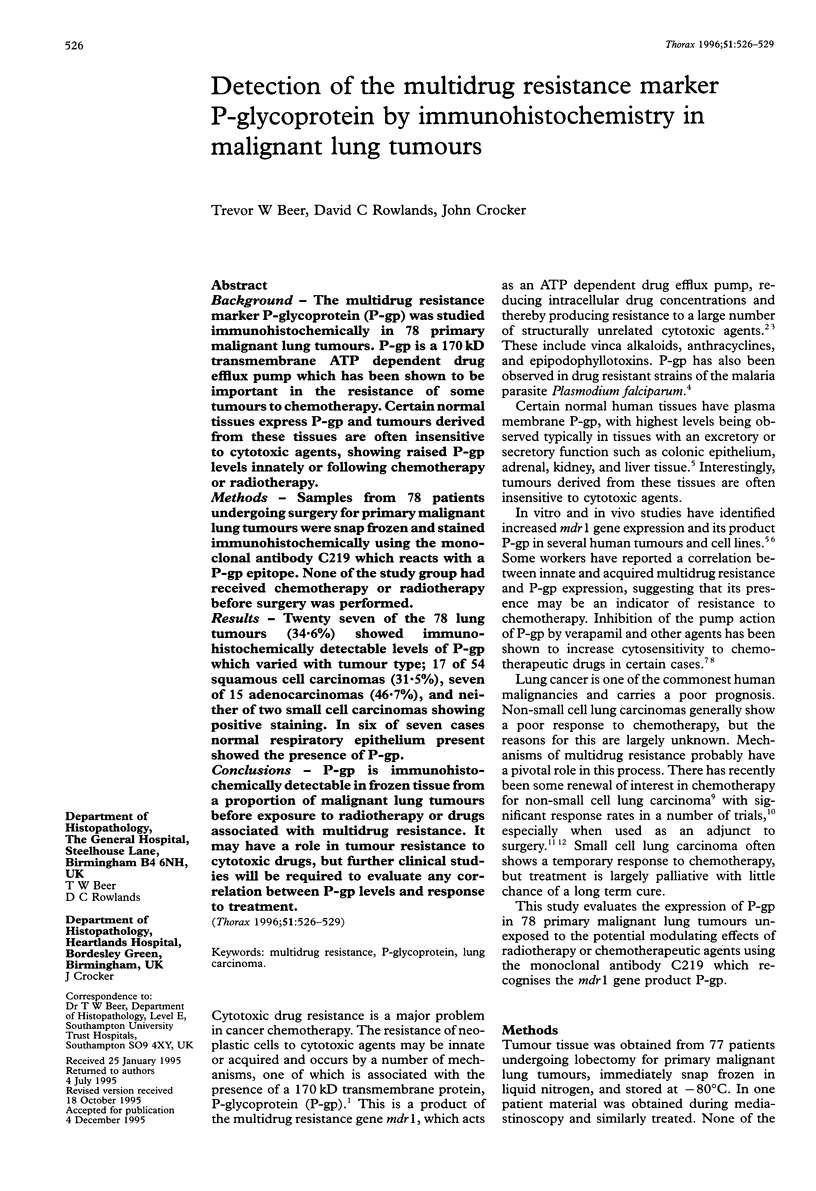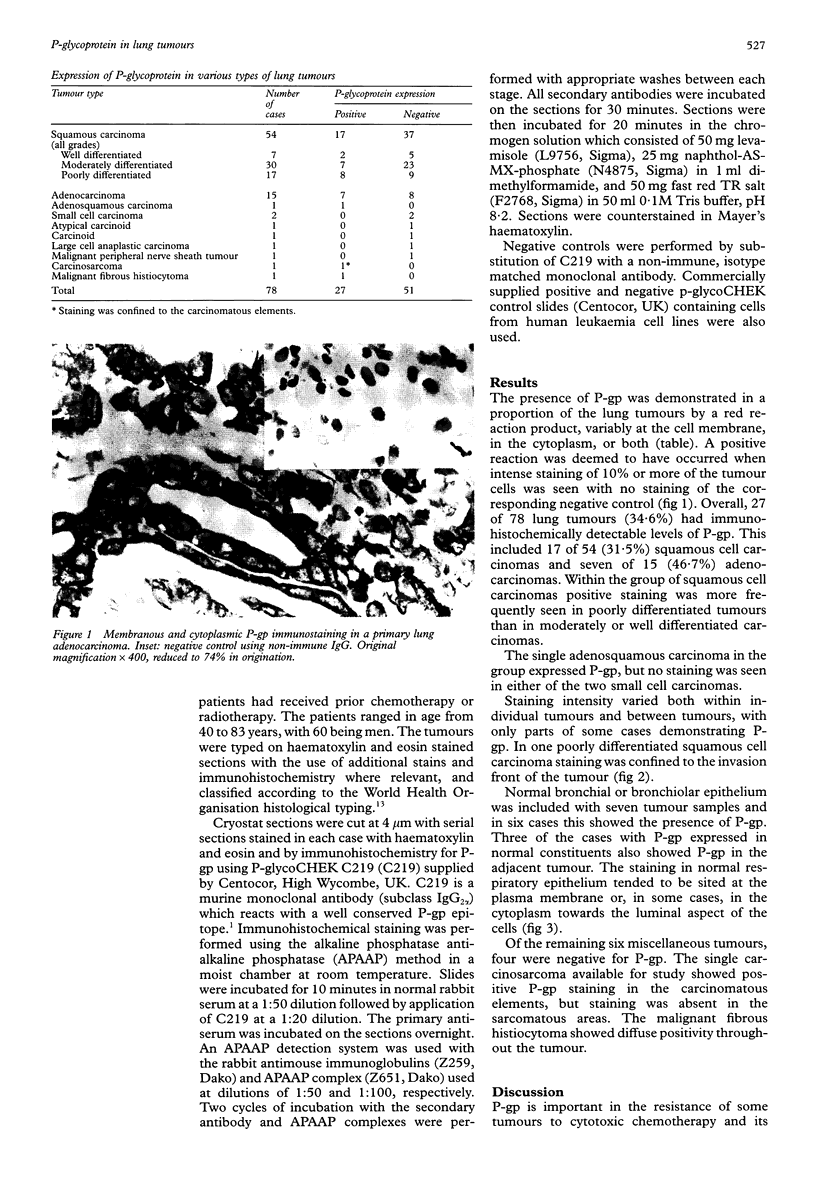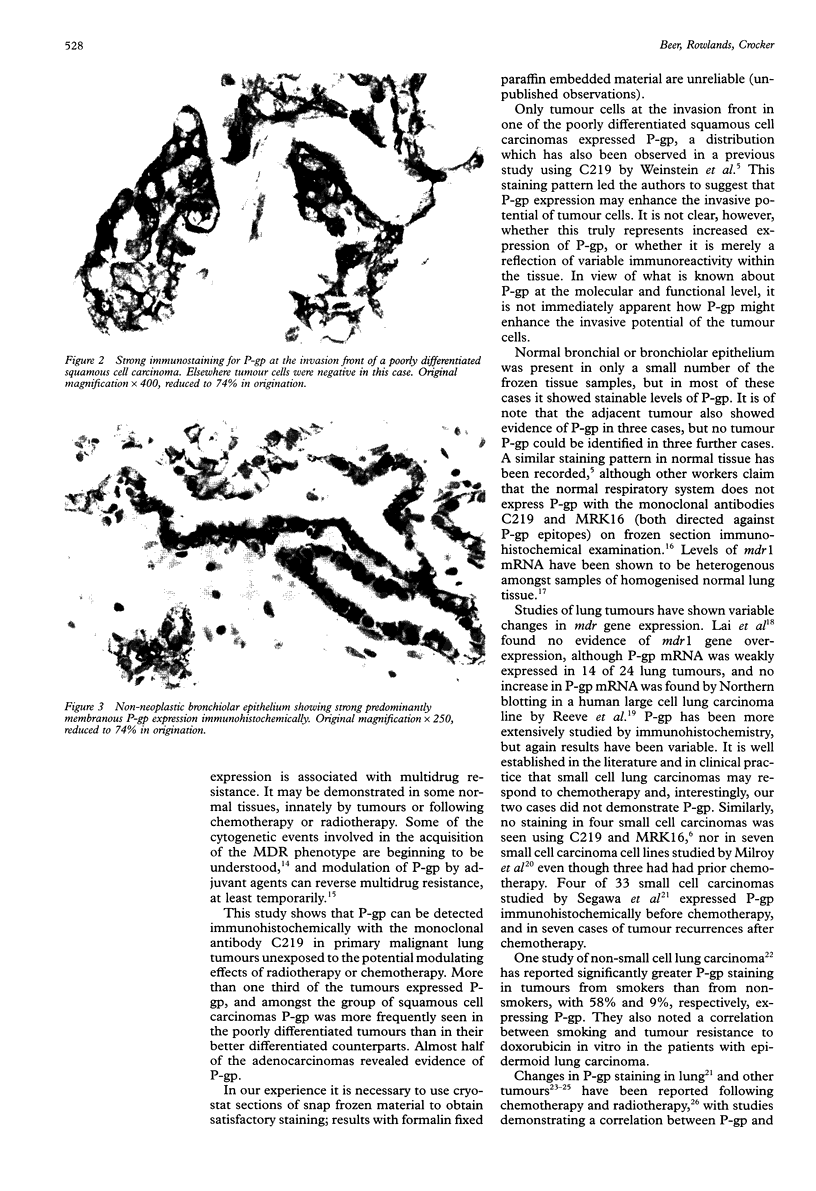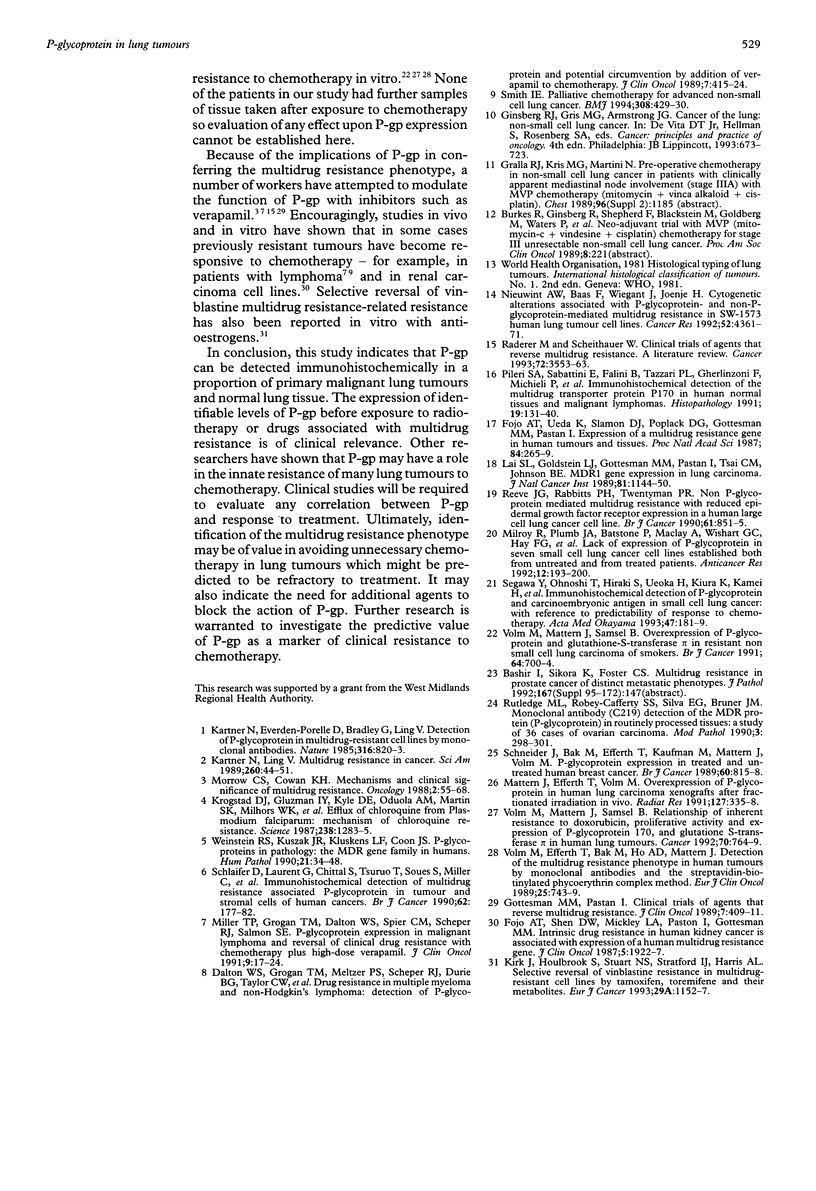Abstract
BACKGROUND: The multidrug resistance marker P-glycoprotein (P-gp) was studied immunohistochemically in 78 primary malignant lung tumours. P-gp is a 170 kD transmembrane ATP dependent drug efflux pump which has been shown to be important in the resistance of some tumours to chemotherapy. Certain normal tissues express P-gp and tumours derived from these tissues are often insensitive to cytotoxic agents, showing raised P-gp levels innately or following chemotherapy or radiotherapy. METHODS: Samples from 78 patients undergoing surgery for primary malignant lung tumours were snap frozen and stained immunohistochemically using the monoclonal antibody C219 which reacts with a P-gp epitope. None of the study group had received chemotherapy or radiotherapy before surgery was performed. RESULTS: Twenty seven of the 78 lung tumours (34.6%) showed immunohistochemically detectable levels of P-gp which varied with tumour type; 17 of 54 squamous cell carcinomas (31.5%), seven of 15 adenocarcinomas (46.7%), and neither of two small cell carcinomas showing positive staining. In six of seven cases normal respiratory epithelium present showed the presence of P-gp. CONCLUSIONS: P-gp is immunohistochemically detectable in frozen tissue from a proportion of malignant lung tumours before exposure to radiotherapy or drugs associated with multidrug resistance. It may have a role in tumour resistance to cytotoxic drugs, but further clinical studies will be required to evaluate any correlation between P-gp levels and response to treatment.
Full text
PDF



Images in this article
Selected References
These references are in PubMed. This may not be the complete list of references from this article.
- Dalton W. S., Grogan T. M., Meltzer P. S., Scheper R. J., Durie B. G., Taylor C. W., Miller T. P., Salmon S. E. Drug-resistance in multiple myeloma and non-Hodgkin's lymphoma: detection of P-glycoprotein and potential circumvention by addition of verapamil to chemotherapy. J Clin Oncol. 1989 Apr;7(4):415–424. doi: 10.1200/JCO.1989.7.4.415. [DOI] [PubMed] [Google Scholar]
- Fojo A. T., Shen D. W., Mickley L. A., Pastan I., Gottesman M. M. Intrinsic drug resistance in human kidney cancer is associated with expression of a human multidrug-resistance gene. J Clin Oncol. 1987 Dec;5(12):1922–1927. doi: 10.1200/JCO.1987.5.12.1922. [DOI] [PubMed] [Google Scholar]
- Fojo A. T., Ueda K., Slamon D. J., Poplack D. G., Gottesman M. M., Pastan I. Expression of a multidrug-resistance gene in human tumors and tissues. Proc Natl Acad Sci U S A. 1987 Jan;84(1):265–269. doi: 10.1073/pnas.84.1.265. [DOI] [PMC free article] [PubMed] [Google Scholar]
- Gottesman M. M., Pastan I. Clinical trials of agents that reverse multidrug-resistance. J Clin Oncol. 1989 Apr;7(4):409–411. doi: 10.1200/JCO.1989.7.4.409. [DOI] [PubMed] [Google Scholar]
- Kartner N., Evernden-Porelle D., Bradley G., Ling V. Detection of P-glycoprotein in multidrug-resistant cell lines by monoclonal antibodies. 1985 Aug 29-Sep 4Nature. 316(6031):820–823. doi: 10.1038/316820a0. [DOI] [PubMed] [Google Scholar]
- Kartner N., Ling V. Multidrug resistance in cancer. Sci Am. 1989 Mar;260(3):44–51. doi: 10.1038/scientificamerican0389-44. [DOI] [PubMed] [Google Scholar]
- Kirk J., Houlbrook S., Stuart N. S., Stratford I. J., Harris A. L., Carmichael J. Selective reversal of vinblastine resistance in multidrug-resistant cell lines by tamoxifen, toremifene and their metabolites. Eur J Cancer. 1993;29A(8):1152–1157. doi: 10.1016/s0959-8049(05)80306-5. [DOI] [PubMed] [Google Scholar]
- Krogstad D. J., Gluzman I. Y., Kyle D. E., Oduola A. M., Martin S. K., Milhous W. K., Schlesinger P. H. Efflux of chloroquine from Plasmodium falciparum: mechanism of chloroquine resistance. Science. 1987 Nov 27;238(4831):1283–1285. doi: 10.1126/science.3317830. [DOI] [PubMed] [Google Scholar]
- Lai S. L., Goldstein L. J., Gottesman M. M., Pastan I., Tsai C. M., Johnson B. E., Mulshine J. L., Ihde D. C., Kayser K., Gazdar A. F. MDR1 gene expression in lung cancer. J Natl Cancer Inst. 1989 Aug 2;81(15):1144–1150. doi: 10.1093/jnci/81.15.1144. [DOI] [PubMed] [Google Scholar]
- Mattern J., Efferth T., Volm M. Overexpression of P-glycoprotein in human lung carcinoma xenografts after fractionated irradiation in vivo. Radiat Res. 1991 Sep;127(3):335–338. [PubMed] [Google Scholar]
- Miller T. P., Grogan T. M., Dalton W. S., Spier C. M., Scheper R. J., Salmon S. E. P-glycoprotein expression in malignant lymphoma and reversal of clinical drug resistance with chemotherapy plus high-dose verapamil. J Clin Oncol. 1991 Jan;9(1):17–24. doi: 10.1200/JCO.1991.9.1.17. [DOI] [PubMed] [Google Scholar]
- Milroy R., Plumb J. A., Batstone P., Maclay A., Wishart G. C., Hay F. G., Candlish W., Adamson R., Khan M. Z., Banham S. Lack of expression of P-glycoprotein in 7 small cell lung cancer cell lines established both from untreated and from treated patients. Anticancer Res. 1992 Jan-Feb;12(1):193–200. [PubMed] [Google Scholar]
- Morrow C. S., Cowan K. H. Mechanisms and clinical significance of multidrug resistance. Oncology (Williston Park) 1988 Oct;2(10):55-63, 66-8. [PubMed] [Google Scholar]
- Nieuwint A. W., Baas F., Wiegant J., Joenje H. Cytogenetic alterations associated with P-glycoprotein- and non-P-glycoprotein-mediated multidrug resistance in SW-1573 human lung tumor cell lines. Cancer Res. 1992 Aug 15;52(16):4361–4371. [PubMed] [Google Scholar]
- Pileri S. A., Sabattini E., Falini B., Tazzari P. L., Gherlinzoni F., Michieli M. G., Damiani D., Zucchini L., Gobbi M., Tsuruo T. Immunohistochemical detection of the multidrug transport protein P170 in human normal tissues and malignant lymphomas. Histopathology. 1991 Aug;19(2):131–140. doi: 10.1111/j.1365-2559.1991.tb00003.x. [DOI] [PubMed] [Google Scholar]
- Raderer M., Scheithauer W. Clinical trials of agents that reverse multidrug resistance. A literature review. Cancer. 1993 Dec 15;72(12):3553–3563. doi: 10.1002/1097-0142(19931215)72:12<3553::aid-cncr2820721203>3.0.co;2-b. [DOI] [PubMed] [Google Scholar]
- Reeve J. G., Rabbitts P. H., Twentyman P. R. Non-P-glycoprotein-mediated multidrug resistance with reduced EGF receptor expression in a human large cell lung cancer cell line. Br J Cancer. 1990 Jun;61(6):851–855. doi: 10.1038/bjc.1990.190. [DOI] [PMC free article] [PubMed] [Google Scholar]
- Rutledge M. L., Robey-Cafferty S. S., Silva E. G., Bruner J. M. Monoclonal antibody C219 detection of the multidrug-resistant protein P-glycoprotein in routinely processed tissues: a study of 36 cases of ovarian carcinoma. Mod Pathol. 1990 May;3(3):298–301. [PubMed] [Google Scholar]
- Schlaifer D., Laurent G., Chittal S., Tsuruo T., Soues S., Muller C., Charcosset J. Y., Alard C., Brousset P., Mazerrolles C. Immunohistochemical detection of multidrug resistance associated P-glycoprotein in tumour and stromal cells of human cancers. Br J Cancer. 1990 Aug;62(2):177–182. doi: 10.1038/bjc.1990.256. [DOI] [PMC free article] [PubMed] [Google Scholar]
- Schneider J., Bak M., Efferth T., Kaufmann M., Mattern J., Volm M. P-glycoprotein expression in treated and untreated human breast cancer. Br J Cancer. 1989 Dec;60(6):815–818. doi: 10.1038/bjc.1989.372. [DOI] [PMC free article] [PubMed] [Google Scholar]
- Segawa Y., Ohnoshi T., Hiraki S., Ueoka H., Kiura K., Kamei H., Tabata M., Shibayama T., Miyatake K., Genba K. Immunohistochemical detection of P-glycoprotein and carcinoembryonic antigen in small cell lung cancer: with reference to predictability of response to chemotherapy. Acta Med Okayama. 1993 Jun;47(3):181–189. doi: 10.18926/AMO/31590. [DOI] [PubMed] [Google Scholar]
- Smith I. E. Palliative chemotherapy for advanced non-small cell lung cancer. BMJ. 1994 Feb 12;308(6926):429–430. doi: 10.1136/bmj.308.6926.429. [DOI] [PMC free article] [PubMed] [Google Scholar]
- Volm M., Efferth T., Bak M., Ho A. D., Mattern J. Detection of the multidrug resistant phenotype in human tumours by monoclonal antibodies and the streptavidin-biotinylated phycoerythrin complex method. Eur J Cancer Clin Oncol. 1989 Apr;25(4):743–749. doi: 10.1016/0277-5379(89)90213-7. [DOI] [PubMed] [Google Scholar]
- Volm M., Mattern J., Samsel B. Overexpression of P-glycoprotein and glutathione S-transferase-pi in resistant non-small cell lung carcinomas of smokers. Br J Cancer. 1991 Oct;64(4):700–704. doi: 10.1038/bjc.1991.384. [DOI] [PMC free article] [PubMed] [Google Scholar]
- Volm M., Mattern J., Samsel B. Relationship of inherent resistance to doxorubicin, proliferative activity and expression of P-glycoprotein 170, and glutathione S-transferase-pi in human lung tumors. Cancer. 1992 Aug 15;70(4):764–769. doi: 10.1002/1097-0142(19920815)70:4<764::aid-cncr2820700408>3.0.co;2-m. [DOI] [PubMed] [Google Scholar]
- Weinstein R. S., Kuszak J. R., Kluskens L. F., Coon J. S. P-glycoproteins in pathology: the multidrug resistance gene family in humans. Hum Pathol. 1990 Jan;21(1):34–48. doi: 10.1016/0046-8177(90)90073-e. [DOI] [PubMed] [Google Scholar]





